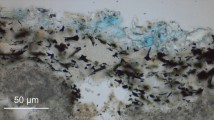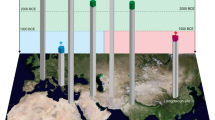Abstract
IT may be of interest to record a discovery I have made, with Dr. Grassini, which should prove of importance in the study of old ceramics, and also of the commerce and industries of the Romans of the first century after Christ. My researches upon the antiquity of the boric acid bearing ‘lagoni’ and ‘soffioni’ of Tuscany led me to examine the glaze of the famous Arezzo pottery (vasi sigillati aretini). These vases are among the most beautiful and important of the artistic works of the Romans of the first century before and after Christ.
This is a preview of subscription content, access via your institution
Access options
Subscribe to this journal
Receive 51 print issues and online access
$199.00 per year
only $3.90 per issue
Buy this article
- Purchase on Springer Link
- Instant access to full article PDF
Prices may be subject to local taxes which are calculated during checkout
Similar content being viewed by others
References
"Die rote römische Topferwaare mit besonderer Rücksicht auf ihre Glasur. Eine kunstgewerbliche Skizze." Von Dr. Franz Keller, Rektor der Gewerbschule in Speyer. (Heidelberg: Buchhandlung von Carl Gross; 1876.)
Author information
Authors and Affiliations
Rights and permissions
About this article
Cite this article
NASINI, R. Boric Acid in the Glaze of the Sealed Vases of Arezzo. Nature 126, 877–878 (1930). https://doi.org/10.1038/126877b0
Issue Date:
DOI: https://doi.org/10.1038/126877b0
Comments
By submitting a comment you agree to abide by our Terms and Community Guidelines. If you find something abusive or that does not comply with our terms or guidelines please flag it as inappropriate.



